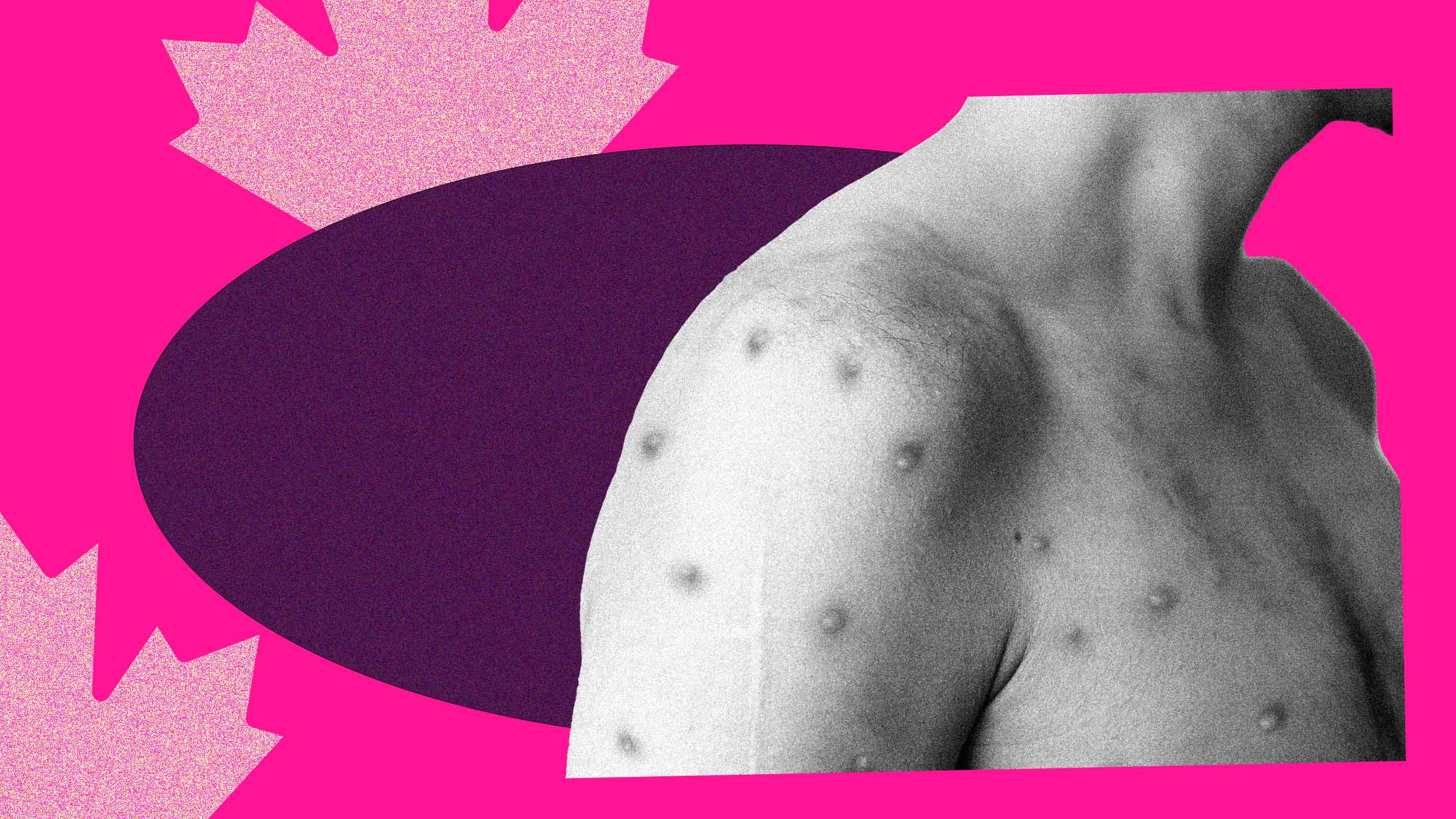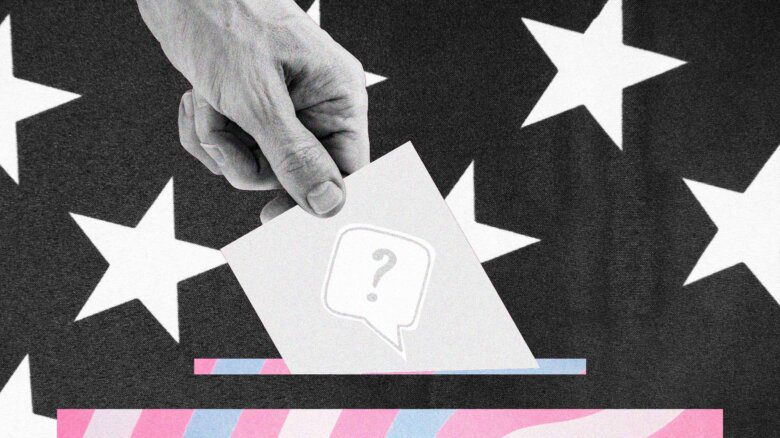Last month, at around 9:30 p.m. on a Monday, I got on the phone with a Telehealth nurse. The day before, a sexual partner had texted me to say that he had Mpox. I wasn’t worried—I had been vaccinated—but I called the Telehealth line, wondering what I needed to do next.
The nurse was very sweet but clueless—we just ended up googling various provincial and federal public health web pages together on the phone like we were doing a group project for school. I had been vaccinated for Mpox in 2022, but the nurse was unsure what the protocol was for my specific situation. The best advice she could give me was to “monitor symptoms.” She signed off the call with a “Good luck!”
After I hung up the phone with the nurse, I didn’t know where I could turn with questions. Two years after an Mpox outbreak caused several Canadian provinces to start their own vaccination campaigns, there is still little information available for people who contract the virus. Canada’s healthcare system, it turns out, still isn’t equipped to support people who get this highly contagious virus.
Back in the summer of 2022, an outbreak of Mpox—largely among men who have sex with men—prompted a shaky vaccine rollout in Canada that struggled to meet demand. While uptake in May and June of 2022 was high, Toronto public data showed that by February only 15 percent of people who received a first dose completed their full series of shots. I personally completed my full series of shots, and was under the impression that breakthrough cases were rare.
So I still mostly felt unworried the morning after my Telehealth call. While I was symptom-free, some suspicious-looking “razor burn” had showed up.
My partner, who I am in a loving open relationship with (shocking), was first to react. I looked up from my laptop later that day and realized he was wearing a mask, had an armful of Lysol wipes and was saying something about not sharing towels anymore. Pandemic throwback!
To be safe, I went to get the bumps swabbed and tested. That’s when the anxiety spiral began. The clinic told me that breakthrough cases were indeed not rare—as I had assumed they were—and that they were seeing more of them. I texted my friend a picture of my face, “Do you think I have it?” His answer confirmed my fears: he was pretty sure “I had it.”
Maybe it was my anxiety spiral or the years of deep friendship, but I trusted him more than the Telehealth nurse.
If you’re diagnosed with Mpox, both public health agencies say it’s important that you isolate until your symptoms clear. Those symptoms include painful sores, flu-like symptoms, swollen lymph nodes and a fever. Once the sores fully heal and new skin develops, you’re no longer infectious—but this process can take anywhere from two to six weeks.
After I got home from the clinic, my partner gingerly crept around the hallways and I paced in my room. “I read you can give it to cats,” he told me. We have two gorgeous, perfect and sickeningly-loved sphynx cats. I knew my fate was sealed. I was going to be quarantining at the family cottage.
Having a second place to isolate while you’re healing from a rare virus for two to six weeks is a privilege afforded to very few. However I didn’t feel privileged. I felt like a sick Victorian child being sent away to an institution by the seaside. Packing up my things to leave Toronto, I was grumpy and icy, leaving my partner in a huff, knowing there was a chance I could be gone for almost a whole month. Thankfully I can work remotely, but gigs I had planned as a comedian would have to be cancelled. Rave tickets would have to be sold. Podcast recordings rescheduled. Family gatherings marked absent. God knows there are worse things, but I felt like a child who had to cancel their birthday party.
By the time I arrived at the cottage, the flu-like symptoms set in. It dawned on me that I’d be all alone and battling a virus that was strange, painful and weird. The tranquility of the country didn’t make me feel calm’; it made me feel trapped.
Within the next day or two, there were growths on my face. I began an incessant ritual of staring in the mirror at my face for a minimum of twenty minutes per day, watching over the next week as the growths on my face became bulbous, dark and angry. I’d compare my growths to those at various stages of progression I could find online, but mine always seemed a bit different. I constantly worried my healing was taking a bad turn. I regretted going to see The Substance in the theatre the week prior because now it felt like I was in my own body horror movie. I had no one around to anchor my spiralling thoughts. “Maybe I AM Demi Moore in The Substance! Maybe this IS the beginning of some sick tragedy where I pay for my own vanity!”
Three days into my quarantine, I got a call from a public health worker asking to know everywhere I’d been for the last 21 days, which included a trip to NYC, a party, a wedding, multiple comedy shows and a bathhouse. When she responded, “You’re busy!” I felt a pang of guilt. What if I had given this awful infection to someone else? Did I do something wrong? Would I be involved in some kind of ridicule ritual in the public square?
The nurse was thankful I’d been in contact with all my sexual partners and that I knew where I’d contracted the virus. She offered some advice on how to care for my growths and reminded me to stay hydrated. It was nice to hear a caring voice, but her info was mostly stuff I had looked up on my own. When she assured me that I’m a good person, I had to swallow back tears.
By day 5 of isolation, the itching and pain began. I’d read that wounds heal best when they’re wet, so I began dousing my growing sores in Polysporin, Bio-Oil and Vaseline.
My partner and friends became my saving grace in receiving my barrage of text complaints, and FaceTiming me. I tried to further comfort myself by baking cookies before realizing I had no one to share 14 cookies with, and even if I did, these cookies would probably be considered a biohazard.
That same day, I started having to reapply numbing Polysporin multiple times a day to my face for pain, which made writing or doing anything but scrolling TikTok impossible. I popped Advil and allergy medication. I had the shivers, my neck was sore from swollen lymph nodes and I noticed more sores on my dick that I didn’t notice before. I realized my sore throat was caused by Mpox sores growing on my tonsils, which made swallowing painful.
Finally, on day 6, I caught a break. A friend who worked at the sexual health startup Freddie—where I’m a patient— connected me with their nurse practitioner. Although Mpox is not technically an STI, it’s most often spread through sex. When I wasn’t able to sleep because of the pain from my sores, the nurse practitioner I spoke with was able to get me a prescription for a painkiller so I could actually get a good night’s sleep. I felt vindicated when the nurse said he was surprised that my symptoms were so bad despite being vaccinated.
As the days went by, figuring out how to treat my symptoms became exhausting. My mental health declined and I began to worry about permanent scarring. A call with my GP just over a week into my sickness didn’t produce any solutions to help me speed up the recovery of my sores. She mentioned that calamine lotion can help people with chickenpox, but even she admitted that the strategy was a shot in the dark. At one point she even tried pulling up pictures of Mpox sores on her computer.
By day 12 I was much more physically healthy, but the boredom and loneliness sank me into a depression. I looked to nature to heal me with minimal success. One night, I headed to the dock to watch the northern lights. The entire sky pulsated with colour, shimmering and wonderful. Admittedly, this temporarily transformed my mood—but only temporarily.
“There is no excuse—this is not our first outbreak.”
Today, five weeks since my diagnosis, I’m fully recovered. I’m still dealing with lingering red spots and some small but permanent scarring. I feel like this experience might change how I navigate my sex life forever. Now that I’ve had Mpox, I’m fairly immune to getting it again, but how many sexual experiences are actually worth putting my health and the health of my partner on the line? I find myself renegotiating my tolerance for risk. I also can’t help but think about how things might have gone very differently if I didn’t have the privilege to access the right care and accommodations that I did.
This is why queer-led healthcare is so important. Support for marginalized folks dealing with complex health issues and its mental consequences relies heavily on patient initiative in our current system. Texting friends for healthcare advice and support is not a viable solution for those struggling with Mpox. There is no excuse—this is not our first outbreak. Mpox is still considered rare, but that’s only because the heterosexual population is not at as high a risk. It’s time we learned how to navigate this current outbreak with the right support, care and knowledge.


 Why you can trust Xtra
Why you can trust Xtra


